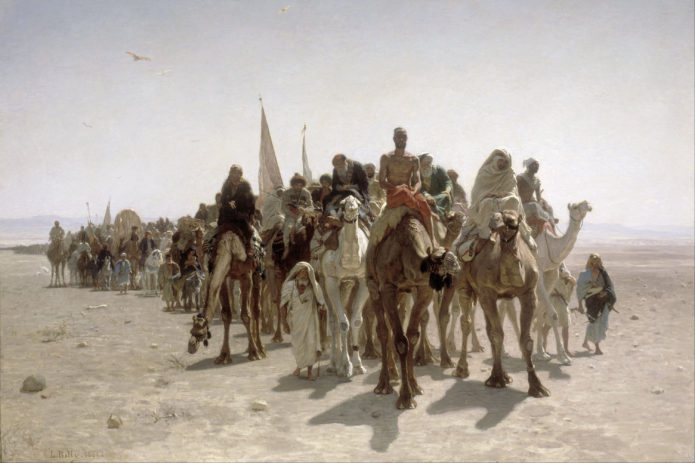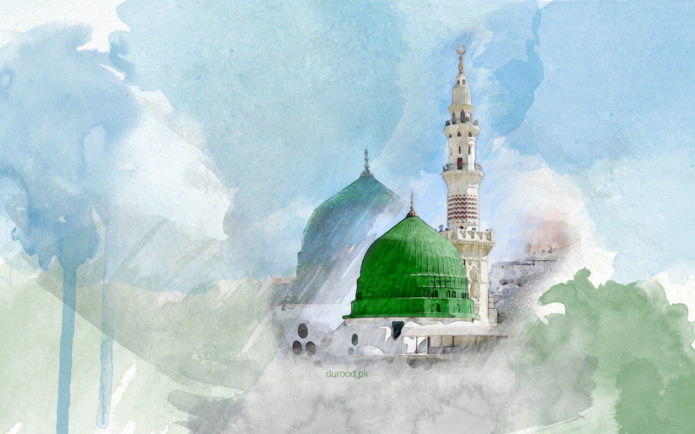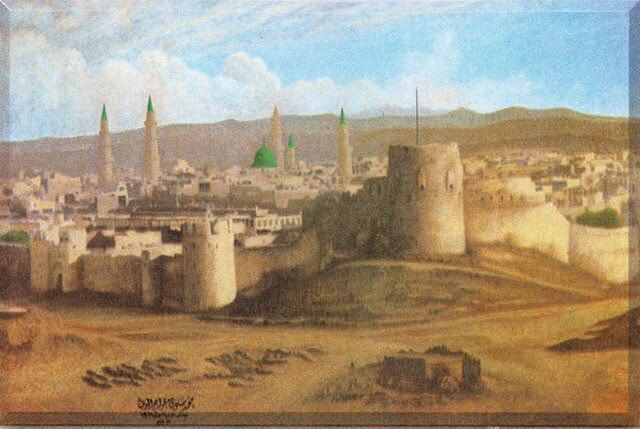Question:
Can you please describe Yazid, the killer of Imam Husain, from the most reliable sources?
What type of family did he come from, and how did he manage to get into power and rule the new Islamic state after just several decades from the demise of the holy Prophet(s)?
Answer:
Who is Hend, the grandmother of Yazid?
She was known as the wife of Abu-Sofyan. Unfortunately, some historians have quoted that she was known in the pre-Islamic era (the era of Jahiliah) as an unchaste woman, to the extent that her son Moawia was related to four fathers! Abu-Sofyan of course was the legitimate one and the other three were his friends (1).
The Grandfather of Yazid
Bani-umaya which was led by Abu-Sofyan was a leading Jahiliah tribe in the pre-Islamic era, and Abu-Sofyan was considered the Pharaoh of Mecca. With the appearance of Islam his kingdom began to shake, and hence he became the first enemy of Islam.
The first battle between Muslims and the infidels of Mecca was the battle of Badr, which was organised basically by Abu-Sofyan, in which the father of Hend (Otbah), her uncle (Shaybah), her son (Handhalah) who were all killed by Imam Ali and the uncle of Prophet, Hamza. Eight people were killed in that battle from the family of Bani-Umaya.
From that time, Bani-Umaya held a very strong animosity against Islam in general, and Imam Ali and Hamza in particular. Therefore, after the battle of Badr, Abu-Sofyan made an oath not to wash his head until he took revenge from Prophet Mohammad. As a result, the second major battle was organised, called the battle of Ohod.
Hend, the wife of Abu-Sofyan, who had also lost her father, son and uncle, had appointed a black slave just to kill Hamza (the uncle of the Prophet), and to cut open his chest, remove his liver, and hand it over to Hend in order for her to chew it so that she might satisfy her anger, and this she did. Historians have narrated that she mutilated the bodies of the martyred from that battle and made a necklace for herself from the cut noses and ears (2)!
A few years later, Abu-Sofyan initiated a campaign against Islam. He mobolised all allied groups and parties including the Jews who were against Islam, to fight Islam. The battle of Ahzab (meaning parties) was the result of that plot, though Muslims fortunately won the battle and all the allied groups were scattered.
Two years before the passing away of the Prophet, the city of Mecca was captured by the Muslim troops and the kingdom of Abu-Sofyan collapsed forever.
Both he and his wife were in Mecca and had not a single doubt that they would be amongst the first to be executed. However, the merciful Prophet of Islam, forgave them all and made an announcement “ Go, you are all free”. Thus, he had no other choice but to embrace Islam, although he never seriously believed. One day he saw the Prophet passing by, and he whispered to himself saying : ‘I wonder how he defeated me’. ‘By the power of Allah’ replied the Prophet after reading his mind.
In the year 10 after the Hejrat (migration), the Holy Prophet of Islam passed away, and the event of Saqifah took place. Abu-Bakr in a political game became the ruler and Imam Ali was ignored. Abu-Sofyan, who was now seemingly a Muslim, though never believed in Islam, came to Imam Ali to pledge allegiance to him. Imam Ali, knowing that he had the intention to split the Muslim community and take advantage of this opportunity for his devilish plans, refused and said to him: “I do not need your support”.
On his way back home, Omar Ibn Khattab, an intimate friend of Abu-Bakr, who was later appointed by him as Second Caliph, saw Abu-Sofyan coming from the house of Imam Ali. He immediately informed Abu-Bakr and asked him to pay an amount of charity to Abu Sofyan which would silence him. The proposal was accepted and Abu-Sofyan shook the hand of Abu-Bakr as Caliph.
Abu-Bakr, in return, as a reward, appointed his son Yazid, brother of Moawia, as the commander-in-chief of an army which was dispatched for a battle in the then border of Islam, Damascus. The army of Islam won the battle and Yazid was appointed as the governor of Syria.
Moawia, the Father of Yazid
A few years later, during the reign of the second Caliph, Omar Ibn Khattab, a disastrous plague came to Syria and many people died. Yazid, the governor was also affected and hence wrote a letter to the Federal Government asking Omar to appoint Moawia as his successor. Again the proposal was accepted and Moawia became the governor of Syria and the neighboring states. From that time, the pillars of the Bani-Ummaya dynasty started to become re-established.
Before continuing with the story I’d like to mention a Hadith from the Prophet for you: Tabari, the famous historian has quoted that the Prophet once saw Abu-Sofyan riding a camel and his two sons, Moawia and Yazid were walking, one in front and one behind the camel. The Prophet said: ‘May God curse the rider and the one in front and in the back.’ (3).
Years passed by and he was still the governor in Damascus until the third Caliph, Uthman came into power. Things were improving, for Uthman was from the same family tree of Bani-Umaya. Abu-Sofyan was still alive and his dreams were becoming reality, i.e. to rule Muslims and destroy Islam under the mask of Islam.
Therefore, during the reign of Uthman, Moawia had more freedom and designed many plots against Islam. It was during this time that his true nature became apparent and he started drinking alcohol. Obadat-ibn-Samet, who was one of the distinguished companions of the Prophet, was one day walking in Damascus. He was surprised to see a caravan of camels carrying a liquid which looked like wine. Given the fact that it was an Islamic state, and drinking of alcohol is forbidden in Islam, he asked the leader of the caravan if the liquid was olive oil?! The man answered: No, it is wine, and I am delivering the order of Amirul-Mo’menin Moawia! Upon hearing that, Obadat ripped off all the skins of wine.
The years passed in this manner and Moawia freely ruled for about 19 years until Uthman was killed by Muslims and they asked Imam Ali to accept the leadership. One of the first duties of Imam Ali was to write a letter to Moawia asking him to resign, otherwise he would be sacked, since he didn’t deserve the position. The answer of course was negative, and the battle of Seffin was organised by Moawia against Imam Ali.
Unfortunately, the leadership of Imam Ali did not last long, as after almost four years, the Imam was assassinated. Since then, Moawia became the one and only leader of the Islamic Ummah.
In order for him to seek revenge from Imam Ali and his followers, he put the followers of the Imam under the utmost oppression. The story of Bosr’s raid is one of his crimes. Hamdan was a tribe of Muslims who loved Imam Ali. Moawia appointed his cruel commander, Bosr Ibn Artat to attack the tribe. In a barbaric raid, all the men of Hamdan were killed, their houses were set on fire and their ladies, including their children, were taken as prisoners of war and sold in the market as slaves! (4). This is the first time in Islamic history that Muslims were taken as prisoners of war by so called Muslims (5).
Final goal of Moawia
Mas’oudi, a very reliable historian, has quoted in his book Morooju-dahab from Motaref son of Moghayra that: “Once I made a trip with my father to Damascus where Moawia was ruling. My father was visiting Moawia every night and when coming back home, he was praising Moawia and acknowledging his intelligence. Suddenly, one night he came back home in a bad mood. He didn’t even have his dinner. I asked him what was wrong? He replied: I’ve come back from the most devilish person, my dear son! Surprised, I asked him who he meant? He turned around and said:
– Moawia!
– Who? Moawia?! You were praising him every night!
– Yes, but I never knew his real intention. Tonight, when all the people around us went away, it was only he and I. I took advantage of the opportunity and told him to reduce his pressure on the followers of Imam Ali, since he had gotten everything he wanted.
However, he replied: “You are talking nonsense. Look at Abu-Bakr, the first Caliph. He died and with his death his name has almost died too. The same with Omar and Uthman. But the name of this man (meaning the Prophet) is still repeated 5 times a day! Nay, I will never stop the pressure until I bury his name!” (6).
Mobilizing the Muslims towards Yazid
In the last 7 years of his ruling, Moawia started paving the way for his son Yazid to be the next caliph. Let me tell you some of his plans:
Assassinating the suspected candidates:
His first plan was to assassinate and get rid of those who could be in the pipeline of leadership. One day, he delivered a lecture in Damascus and asked the crowd their opinion for the next caliph, as he did not want to appoint anyone without their consent. They unanimously replied: “ We are happy with Abdul-Rahman Ibn Khalid.” Moawia, who was thinking of his son Yazid, got upset but did not say a word and swallowed his anger. However, he decided to assassinate Abul-Rahman.
A few months later, Abdul-Rahman fell sick and needed a doctor. Moawia took advantage of the opportunity and sent his own doctor to him and ordered the doctor to poison Abdul-Rahman. The doctor accepted on the condition that he would be exempt from paying his taxes for a whole year. Moawia agreed and the assassination was committed.
Imam Hasan (a.s.) was also in the position of candidatory. Moawia sent some money secretly to the wife of the Imam, Jo’dah, with the message that should she poison Imam Hasan. All the money would be hers and the son of Moawia, Yazid, would be also her husband. The plot was carried out. She killed Imam Hasan with poison. However, Moawia did not fulfill his second promise, reasoning that a woman who is not loyal to the son of the Prophet would definitely not be loyal to his own son!
Other Plans and Methods:
Moawia used different ways and means to pave the way for the leadership of his son. Buying the leaders of the tribes was another plan. Arabs at that time had a tribal life. Each clan had a leader, whose word was law. Therefore, in order to have the support of a tribe you just needed to satisfy the leaders of the tribe. Moawia once called upon the leaders of some of the trouble-making tribes. He offered 100,000 Dinaars to each leader on the condition that they should not protest against Yazid. Among the leaders was a person named Hattat. Moawia gave him 70,000 Dn. When they left the castle, they counted their money and Hattat noticed he was given 3000 less than the others. He returned to the castle angrily and asked Moawia why he had paid him less. “ Your belief is not worth more than that” said Moawia. He said : “No Moawia, buy my belief at the same price”, and he was paid the rest.
Levying heavy taxes to humiliate people was another plan of Moawia’s to force their allegiance.
Yazid comes into Power
By the way, in the year 60 A.H., Moawia, after almost 40 years of ruling, died, and his son Yazid, the tippler, the gambler, the one who had no care for Islam, the one who had all the vengeance of his ancestors in his blood against Islam, came into power. If Moawia was secretly assassinating figures like Imam Hasan, Yazid had no shame barbarically killing the Imam. By his order, the master of the youth of Paradise (Imam Husain), along with his noble companions, were ruthlessly killed, and horses were ridden over their bodies after they were mutilated. Their families were taken as prisoners of war.
Finally, when the severed head of the Master of the youth of Paradise was brought to his castle in Damascus he hit the lips of the Imam with his stick saying : “Today is for the day of Badr.” Meaning, I have revenged now the day of Badr in which my ancestors were killed by Muslims, especially Imam Ali. Then he recited some poems in which he explicitly demonstrated his Kofr (disbelief in Islam).
Just imagine the scene, the head of Imam Husain severed from his body, in front of him are all the orphaned boys and girls whose fathers were killed in front of them a few days before. Lady Zaynab is also amongst those watching Yazid hitting the lips of her dear brother Imam Husain. She courageously stood up and recited the Ayah:
“Let not the unbelievers think that our respite to them is good for themselves, We grant them respite that they may grow in their iniquity; but they will have a shameful punishment.” (3:178).
—-
Footnotes:
(1): Ibn- Jozi, Tadhkeratul-Khawas p.116
(2): Compare and relate it to the evening of Ashoora.
(3): Tabari, Tarikh, 11:357
(4): Ibn-Athir, Osdol-Ghabah 1: 180
(5): Compare and relate it to the captives of Ashoora.
(6): Ibn-Abel-Hadid, Sharh Nahjul-Balagha 1: 463
—-
Answered by: Sheikh Mansour Leghaei




